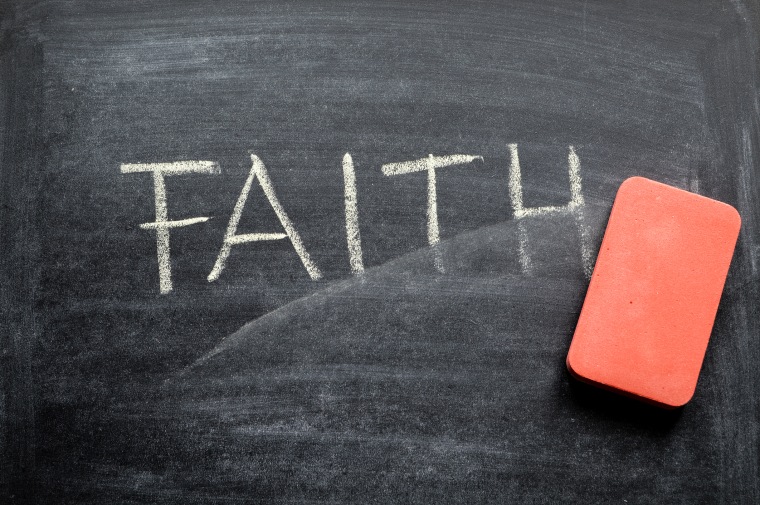Dear journalists covering religion, LGBTQ people of faith exist. Does your reporting reflect that reality?
“When it’s sexuality versus religion, Americans stand divided,” a recent Religion News Service headline read. “Can Religious Freedom and LGBT Rights Co-Exist?” asked the Atlantic in a video series. National Public Radio even aired a seven minute report, “In Religious Freedom Debate, 2 American Values Clash,” that juxtaposed LGBTQ rights against religious rights.

These religion headlines advance the conservative Christian view that you can’t be openly LGBTQ and religious. That’s one view, but reporting it as some kind of objective reality constitutes fake news. Religion journalists, in their pursuit of objective reporting, have no ground to willingly ignore the existence of LGBTQ people of faith.
The reader is left to believe one of two things: journalists who report on the clash of LGBTQ and religious rights are ignorant of LGBTQ religious folks existence, which seems highly unlikely in 2017, or that they actually believe the conservative position. My suspicion is that the latter is often at play under the surface, but I write today to ensure the former becomes less of an excuse.
Journalistic ethics should make it so this question never comes up.
We can disagree about theological ethics. My disagreements with conservative religious ethics go well beyond the existence of LGBTQ religious adherents and include such varied topics as female ordination and dancing. (For the record, I support female ordination and dancing.) Would you ever see religion reporters completely erase female religious leaders, even though the conservative position is that they shouldn’t exist? “Religious values” and “women’s rights” are never touted as being mutually exclusive.
I welcome disagreement and religion reporters illuminating the debates within all religious traditions. But we can’t disagree about my existence. Covering LGBTQ rights and religion as purely opposing forces is journalistic malpractice.
The Atlantic’s McKay Coppins recently told Sojourners’ God Beat podcast that it’s more difficult to “come out” as religious in elite newsrooms than gay. He certainly has a point. The media’s obsession with conservative Christians makes them seem synonymous with Christians and even religion at-large in the average person’s eyes. Coming out as religious is then interpreted as coming out as pro-LGBTQ discrimination, which is rightly frowned upon in secular workplaces. The solution to Coppins’ dilemma is simple: promote the existence of LGBTQ people of faith.
Related: Waiting Until Marriage: Gay Christians Navigate Faith, Sexuality
As a gay, Christian writer myself, I can testify to the fact that coming out as religious in secular spaces is made immensely easier when there is greater understanding that “religious” does not necessarily equal “socially conservative.” Unfortunately, like many of his colleagues on the God Beat, Coppins leaves the discussion with religious and gay communities in seemingly separate camps.
Religion journalists do have positive examples to draw upon.
Christian cake baker Jack Phillips recently stopped by ABC News’ "The View" as his case heads to the Supreme Court. His lawyer, Kristen K. Waggoner, made the familiar conservative argument “the belief that marriage is between a man and a woman cuts across all the major religions.” That’s a well-rehearsed talking point, but a blatantly false argument. Waggoner made it twice on air before being challenged.
ABC News Correspondent and "View" Co-Host Sara Haines responded, “Actually, that’s evolved in a lot of religions.” Waggoner tried to cut her off by saying, "No, it actually hasn’t." Haines continued on undeterred. “My brother is gay, and in our church it’s fine for him to get married. There are a lot of God-fearing, Christian gays that are accepted and loved,” she said to cheers from the studio audience.
Responsible journalism shouldn’t be dependent on journalists having gay brothers.
Religion journalists should make the effort to note that ideas like Waggoner’s are one perspective on Christianity, but not the only one. It might even help to quote polling showing most religious Americans do not support religiously based service refusals to gay people.
Perhaps a decade ago it would have been justifiable to write off the religious and queer community in religion reporting as insignificant. As a closeted gay high school student very active in my church’s youth group a decade ago, I wish there would have been more courageous journalism.
I still remember reading a great article, “Even on Religious Campuses, Students Fight for Gay Identity,” by former New York Times reporter Erik Eckholm in 2011 when I was in college and not long after I came out. “Many of the newly assertive students grew up as Christians and developed a sense of their sexual identities only after starting college, and after years of inner torment,” he wrote.
Visiting the New York Times newsroom last year, I had the chance to thank Eckholm for writing the article. The ways journalists cover religion and sexuality may not seem significant, but it has a profound impact on people’s religious practice. Most people are raised in a specific tradition -- or no tradition -- and the media is the only way they can experience different religious ideas.
The Society of Professional Journalists' Code of Ethics includes “Be vigilant and courageous about holding those with power accountable. Give voice to the voiceless.” Religion journalists have a choice to cover courageous queer people of faith or reinforce destructive power dynamics from religious leaders seeking to maintain power. Which path upholds the mission of journalism?
Imagine a closeted queer teenager in a conservative religious community. Imagine the damage reading the headline “When it’s sexuality versus religion, Americans stand divided” does to that teen’s self-esteem. They are left feeling like they must choose between their own sexuality and religion.
That’s fake news. A vibrant and growing religious and queer community exits. Religion reporters have an ethical responsibility to not erase us from the story.
Guthrie Graves-Fitzsimmons writes on religion and public policy. He lives in Louisville, Kentucky. Follow him on Twitter @guthriegf.